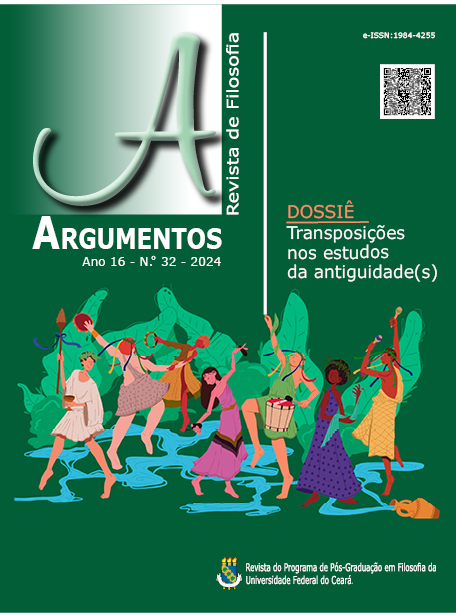Research on Classical Antiquity and dialogue with Brazilian society: some reflections from Federal University of Parana (UFPR)
Keywords:
Classical Studies. Community services. Digital culture.Abstract
The aim of this paper is to articulate research produced from international bias with teaching Ancient History in the Department of History at UFPR, to think how, through community services, it is possible to align critical theory and social transformation. To do so, I shall start from theoretical approach that I consider relevant to outline the paths taken, mainly from the relationship between History, Archeology and Reception to, subsequently, present an analisys of two experiences: the project Grécia e Roma na Escola coordinated by professor Alessandro Rolim de Moura in which I had the opportunity to act as vice-coordinator, and the blog Antiga e Conexões.
References
BASSANI, P. B. S.; MAGNUS, E. B. Práticas de curadoria como atividades de aprendizagem na cultura digital. In: SANTOS, E. O. et. al. (Orgs.). Informática na Educação: fundamentos e práticas. Porto Alegre: Sociedade Brasileira de Computação, 2021. (Série Informática na Educação, v. 1).
BAUDRILLARD, J. The ilusion of the end. In: JENKINS, K. (Org.). The post-modern reader. Londres: Routledge, 1997. p. 39-46.
CORRÊA, E.; BERTOCCHI, D. O papel do comunicador num cenário de curadoria algorítmica de informação. In: SAAD, E. N. (Org.). Curadoria digital e o campo da comunicação. São Paulo: ECA/ USP, 2012. p. 22-39.
FOUCAULT, M. A ordem do discurso. São Paulo: Loyola, 1996.
FOUCAULT, M. Arqueologia do saber. Rio de Janeiro: Forense Universitária, 1997.
GARRAFFONI, R. S. Os Antigos Gregos no acervo do Museu Paranaense: recepção dos clássicos, poesia simbolista e política. Curitiba: Edição por demanda/SAMP/Museu Paranaense, 2018.
HARDWICK, L. Reception Studies. Oxford: OUP, 2003.
LEMOS, A. Cibercultura como território recombinante. In: TRIVINHO, E.; CAZELOTO, E. (Orgs.). A cibercultura e seu espelho: campo de conhecimento emergente e nova vivência humana na era da imersão interativa. São Paulo: ABCiber; Instituto Itaú Cultural, 2009.
LITTLE, B. J. Historical Archaeology: why the past matters. Walnut Creek: Left Coast Press, 2007.
LOWENTHAL, D. The past is a foreign country. Cambridge: CUP, 1985.
LYOTARD, J-F. The postmodern condition. In: JENKINS, K. (Org.). The post-modern reader. Londres: Routledge, 1997. p. 36-38.
MOURA, A. R.; GARRAFFONI, R. S. As línguas clássicas no ensino fundamental: considerações a partir de uma experiência recente. In: PRATA, P.; FORTES, F. (Orgs.). O Latim hoje: reflexões sobre cultura clássica e ensino. Campinas: Mercado de Letras, 2015. p. 167-204.
MUNSLOW, A. Deconstructing History. Londres: Routledge, 2000.
SHANKS, M.; HODDER, I. Processual, postprocessual and interpretatives archaeologies. In:
WHITLEY, D. S. (Org.). Reader in archaeological theory: post processual and cognitive approaches. Londres: Routledge, 1998. p. 69-94.
VIEIRA, P. P.; CARNEIRO Jr., R. A. (Orgs.). As histórias das mulheres no Museu Paranaense. Curitiba: Editora da UFPR, 2022.
Downloads
Published
Issue
Section
License
Argumentos magazine is licensed under an International Creative Commons Attribution License.
The Magazine uses CC BY inclusion
1) The authors retain the copyright granted to the magazine or the right to initial publication, with the work regularly licensed under the Creative Commons Attribution, which allows the sharing of the work with acknowledgment of authorship and initial publication in this magazine.
2) The authors are authorized to contract additional applicable contracts, for non-exclusive distribution of the version of the work published in this journal (for example, publication in the institutional repository or as a chapter of the book), recognition of authorship and initial publication in this journal.
3) Authors are authorized and encourage to publish and distribute their work online (for example, in institutional repositories or on their personal pages) at any time before or during the editorial process, as they can generate productive changes, as well as increase the impact and reference of published work.




.jpg)










._._3.png)
1.jpg)
._._._.png)
